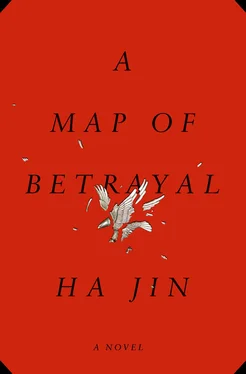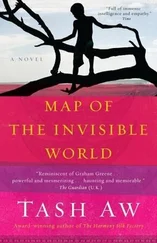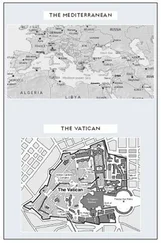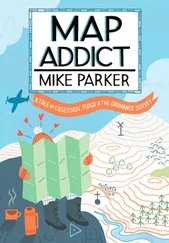Bingwen Chu, the lead Suzie gave me, had been my father’s sole handler on and off for three decades. In his diary Gary referred to him as the Torch, probably because the Chinese character bing means “burning bright.” After I settled down on campus I called his number, and as I’d expected, it was no longer in service. I went to the old address in Chaoyang district, but the four-story building was now occupied by a law firm, a British education agency, and other business offices. I asked a few people. Nobody had ever heard of Bingwen Chu.
In spite of the impasse, I continued perusing my father’s diary and pondering his life. I’d also brought with me a book on him, which had come out a few years before. Titled The Chinese Spook , by Daniel Smith, it portrays him as a brilliant spy, a longtime mole in the CIA, who sold to China a huge amount of intelligence and did immeasurable damage to U.S. national security. The book offers a plethora of information on my father: his education, his unique role in the Chinese intelligence apparatus, his friendship with some American officials in the DC area, his ways of handling money, his tastes in food and drink, his fondness for petite women with abundant hair. But it doesn’t touch on his first marriage and his family in China; his life before he started working for the Americans remains a blank.
There was no denying that my father had been a top spy, but the more I worked on his materials, the more I was convinced that money hadn’t been the primary motivation in his espionage for China. He was a man with a sizable ego; to me, he seemed too big for his boots and full of delusions. By professional standards I wouldn’t say he was a skilled spy, and his role had largely been thrust upon him by circumstances. As his life was gradually taking concrete form in my mind, I came to believe that he’d been not only a betrayer but also someone who’d been betrayed. Before school began, I immersed myself in reconstructing his story. A historian by profession, I wanted to tell it in my own fashion while remaining as objective as possible.
At the beginning of that tumultuous year he arrived in Shanghai from the north. His first name was not Gary but Weimin, and he was a young secret agent working for the Communists. He had come with the task of worming his way into the Nationalists’ internal security system, specifically into the Eighth Bureau, which had been executing a large-scale plan code-named the Trojan Horse. It trained hundreds of agents who were to remain in the city after the Nationalists retreated to Taiwan. The Communists were eager to apprehend all those dangerous elements, who would sabotage factories, disrupt transportation, manufacture counterfeit currency, upset social order, gather intelligence, and would also coordinate with the Nationalist army when it came to retake the mainland. Weimin was a novice in the business of espionage, but as a graduate of Tsinghua University, he was intelligent and better educated than his comrades. In addition, having attended a missionary school for three years, he spoke English fluently and could mix with foreigners.
He had married a month before, and his bride was still in the countryside in northern Shandong. The marriage had been arranged by his parents, but he liked his wife, Yufeng, even though he didn’t feel deep love for her yet. She had a fine figure, abundant hair, glossy skin; her large eyes would twinkle when she smiled. For the time being he wanted to keep her in his home village so that she could help his mother with housework and take care of his parents. The Shangs were well-to-do and owned seven acres of farmland. Weimin believed that eventually he might end up living in a city, Beijing or Tianjin or Jinan, and he had promised his bride he would come back to fetch her in the near future. As a northerner, he didn’t like the south, despite the better food and the foreign influences in the coastal cities. But living in Shanghai didn’t bother him that much, given that he was supposed to be here for only a short period. The political situation in the country was getting clearer every day; anyone could see that the Communists were defeating the Nationalists roundly and would soon take the whole country. It was very likely that Beijing, where Weimin would prefer to live, would become the new capital.
He hadn’t made it into the Eighth Bureau. He lacked the practical skills required for the police work: he couldn’t shoot well, nor could he drive or dismantle a bomb, and he failed the hands-on test miserably. But he aced the political exam, in which his answers all hit the bull’s-eye, and he wrote a concise, lucid essay on the Three Principles of the People put forward by Sun Yat-sen (nationalism, democracy, and the people’s livelihood). The colonel reviewing the results of the exam was impressed and summoned Weimin to his office.
Opening the applicant’s file, Colonel Hsu said to the young man seated before his desk, “Why are you interested in this kind of work, Mr. Shang? As a Tsinghua graduate plus an English major, you can do much better than this. You must agree that none of the jobs we advertised are for someone of your caliber.”
“I need to eat and have to take whatever is available,” Weimin answered, looking at the officer in wonder.
“I like your attitude, young man. You’re able to stoop or straighten up according to circumstances. Tell you what.” The colonel was beefy and had a gold-capped tooth. He wriggled his forefinger to get Weimin closer to his desk. “You should look for employment in foreign services, for example, the U.S. embassy or an international bank. They pay much better.”
“I’m new here and have no idea how to do that.”
Colonel Hsu uncapped his silver fountain pen and wrote something on an index card. He pushed it across the desk to Weimin and said, “Here’s a place where you might try your luck. They need translators, I heard.”
Weimin took the card and saw the name of a U.S. cultural agency and its address. The colonel added, “They give tests regularly nowadays, on Monday mornings. You should get there before nine o’clock.”
Weimin thanked the officer and took his leave. He wasn’t sure he should try foreign services. For such a change of direction he’d have to get the Party’s approval. But to his amazement, when he told his superiors about the opportunity, they encouraged him to apply, saying that the Communists too had something like the Nationalists’ Trojan Horse plan, designed to penetrate all levels of the enemy’s military and administrative systems, including the diplomatic ranks. Yes, he must apply for such a job and do it under an alias, Gary Shang, which sounded savvy and fashionable for a young Chinese man. From now on he must go by this name. The legal papers would be prepared for him right away.
So Weimin became Gary. He went to take the test at the U.S. cultural agency. It was to translate a short essay by the writer Lao She into English without the aid of a dictionary. This wasn’t very hard for him, except that he couldn’t spell some words, such as “cigarette” and “philosopher.” For those two, he put down “smoke” and “thinker” instead. He was certain he had made a number of silly mistakes. Feeling embarrassed, he avoided mentioning the test in front of his comrades.
But the following week a notice came in the mail summoning Gary Shang for an interview. Did this mean he had passed the test? “You must have done pretty well,” said Bingwen Chu, a round-faced, hawk-eyed man, who was just one year older than Gary but was his immediate leader. Bingwen was a more experienced agent, sent over directly from Yan’an, the Communists’ base in the north. Gary figured that the foreign employer probably wanted to interview him because there hadn’t been many applicants — clearly the Americans would flee China soon, and few Chinese were willing to get too involved with them.
Читать дальше











